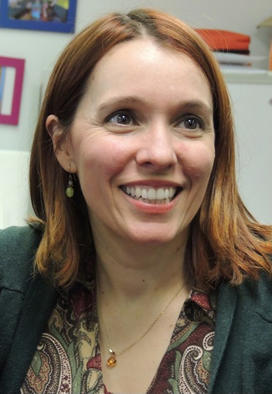Maddie Welch ’92 Teaches Spanish Through Songs

When Maddie Welch ’92 was in high school in Puerto Rico, she joined a musical ensemble that performed traditional folk and Christmas music in Spanish that she viewed as “curious and old-fashioned.” She has since come to view such songs as cultural treasures. As the founder of Canta y Baila Conmigo (“Sing and Dance with Me”), an early childhood music and bilingual education program, she is teaching not only music and language, but, as she puts it, “authentic culture.”
A unique set of experiences in Welch’s life, beginning with her bilingual upbringing in San Juan, led her to create this program, which now operates in more than 11 cities worldwide.
Welch says she grew up in a culture that was “steeped” with music, from children’s songs and lullabies to folk music. In addition, her father is Haitian and played French language music around the house.
When she landed at Princeton, she saw it as “an opportunity to explore all this other stuff I loved ... . It was a playground for my creative impulses.” She joined the Wildcats a cappella group, the Glee Club, and the Princeton University Players. When she studied French formally for the first time in college, she discovered that she pronounced it as a near-native speaker.
Years later, studying bilingual education as a graduate student at Boston University, it struck Welch that even though her father had not spoken to her in French, listening to music in French as a young child had helped her develop an ear for the language. “I realized the power of music in early childhood,” she says. “It reflected all the research of how a young child can remain open to all the phonemes of a language by listening to it during the critical periods of childhood.”
That research was on her mind many years later when she took her own daughter to a Music Together class in Newton, Mass. Music Together, based in Princeton, is one of the largest and oldest early childhood music education programs, offering classes around the world for children (from birth to age 7) and their caregivers. Welch had been a preschool and elementary school Spanish immersion and bilingual education teacher for more than 10 years at that point.
“I was raising my daughter bilingually and these [music] classes were great,” Welch explains. “But I wished I had something in Spanish I could do with her at this critical stage in her development … . The cultural and linguistic piece was missing.”
It wasn’t long before Welch had become a trained Music Together teacher and was invited to teach in Spanish.
“I realized it wasn’t enough to translate songs such as ‘Wheels on the Bus’ or ‘Old MacDonald’ because that was not an authentic cultural experience,” she says. “I found I could not engage families if I used translated materials.”
Welch began to spend time online and in libraries researching children’s songs, lullabies, and folk music from the Spanish-speaking world. “I became a kind of amateur ethnomusicologist,” she says.
In 2008, she began formally offering Canta y Baila Conmigo classes at Music Together centers in the greater Boston area. It became so popular that Music Together asked her to train other teachers. By 2010, Music Together had licensed her curriculum, enabling her to expand its reach. Support from Music Together allowed her to put together a team of designers and accomplished musicians to produce a songbook, with music notation, lyrics and translation into English, and a CD.
“I wanted to hand materials to my families that were heirlooms. My goal was to bring them something that was a gift of language and music,” she explains.
The families drawn to Canta y Baila Conmigo include bilingual families, parents who are heritage Spanish speakers (who learned Spanish at home in the United States), and families who are new to the language.
Ali Stumm Pogorelec ’99 enrolled with her 1-year-old and 3-year-old in 2008, and at the time, she did not speak Spanish. Eight years later, both children are continuing to study and speak Spanish. Pogorelec, who studied the translations of Welch’s materials, began to read to her children in Spanish. Now she converses in the language with Spanish-speaking friends. “They used Canta y Baila Conmigo as the first step to becoming bilingual as a family,” Welch says.











No responses yet